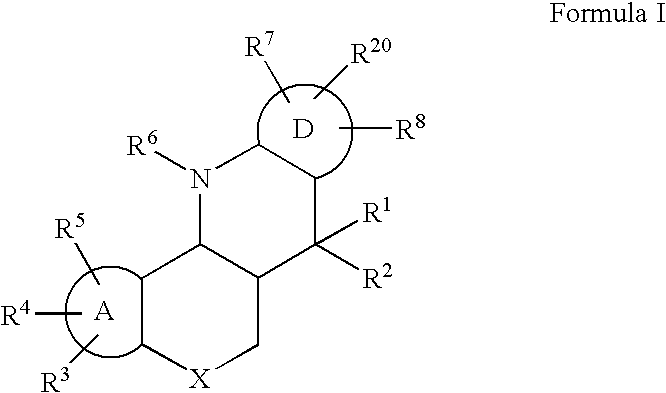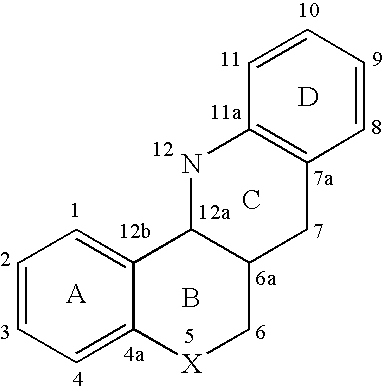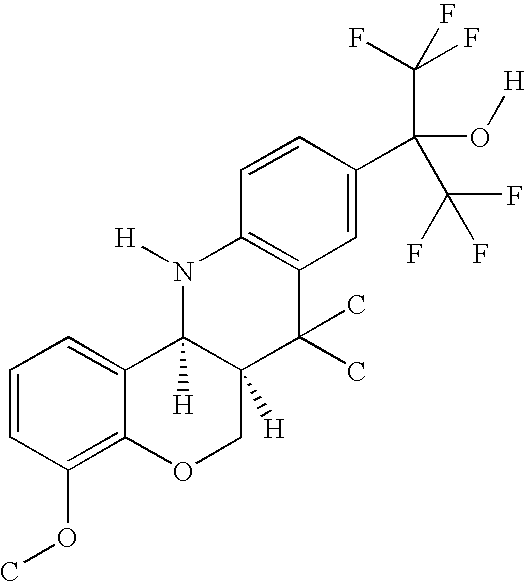ABCA1 elevating compounds
a technology of elevating compounds and abca1, which is applied in the field of abca1 elevating compounds, can solve the problems of increasing plasma triglycerides and liver lipid deposition, increasing and undesirable elevated serum levels of ldl cholesterol
- Summary
- Abstract
- Description
- Claims
- Application Information
AI Technical Summary
Problems solved by technology
Method used
Image
Examples
example 1
Preparation of a Compound of Formula (3)
A. Preparation of a Compound of Formula (3) in which A is Phenyl, R1 and R2 are Methyl, R3 is 2-Methoxy, R4 and R5 are Hydrogen, and X is Oxygen
[0356]
[0357] To a solution of 2-hydroxy-5-methoxybenzaldehyde (7.6 g, 50 mmol) in dry N,N-dimethylformamide (100 mL) was added potassium carbonate (10.4 g), followed by 1-bromo-3-methylbut-2-ene (10.0 g, 67 mmol). The mixture was stirred at room temperature for 48 hours and ethyl acetate added. Sufficient 1M hydrochloric acid was cautiously added to neutralize the base, and the organic layer washed with water three times, followed by brine, and dried over magnesium sulfate. The mixture was filtered, and solvent removed from the filtrate under reduced pressure, to provide 5-methoxy-2-(3-methylbut-2-enyloxy)benzaldehyde.
[0358]1H NMR (400 MHz, CDCl3) δ 1.73(s, 3H), 1.79(s, 3H), 3.8(s, 3H), 4.6(d, J=6.6 Hz, 2H), 5.48(m, 1H), 6.96(d, J=9.3 Hz, 1H), 7.12(dd, J=9.0, 3.5 Hz, 1H), 7.52(d, J=3.5 Hz, 1H), 10.4...
example 2
Preparation of a Compound of Formula (3)
A. Preparation of a Compound of Formula (3) in which A is Phenyl, R1 is Methyl, R2 is 3-Methylbut-2-Enyl, R3 is 2-Methoxy, R4 and R5 are Hydrogen, and X is Oxygen
[0399]
[0400] To a solution of 2-hydroxy-6-methoxybenzaldehyde (4.72 g, 30.43 mmol) in dry DMF (50 ml) was added geranyl bromide (7.5 g, 33.50 mmol) followed by solid potassium carbonate (5.5 g, 39.86 mmol). The mixture was stirred at room temperature for 48 h. The suspension was filtered through a layer of dry sodium sulfate (top) and silica gel (bottom), washed with 200 ml ethyl acetate and decanted into a separatory funnel. The mixture washed sequentially with aqueous ammonium chloride, water (twice), brine, and the organic phase was dried over Na2SO4. The solution was concentrated in vacuo on a rotovap. The brown gel material was then purified by chromatography via silica gel using 8:2 hexanes:ethyl acetate eluent to provide 2-((E)-3,7-dimethylocta-2,6-dienyloxy)-6-methoxybenzald...
example 3
Preparation of a Compound of Formula (4)
A. Preparation of a Compound of Formula (4) in which D is Phenyl, R6, R7, and R8 are Hydrogen, and R20 is (4-Methylphenyl)Pyrazol-4-Yl
[0403]
[0404] 4-Nitrophenylhydrazine (603 mg) and 2-(4-methylphenyl)propane-1,3-dial (639 mg) were placed in 10 mL of ethanol and heated at reflux for 3 hours. The intermediate, 4-(4-methylphenyl)-1-(4-nitrophenyl)pyrazole, was collected by filtration and of which used without further purification.
[0405] The 4-nitrophenyl compound (363 mg) was dissolved into a methanol (20 mL) and EtOAc (20 mL) solution and 10 mg of Pd / C catalyst was added. The reaction mixture was shaken in a Parr apparatus under hydrogen at 50 psi for 3 hours. After which, the product was filtered through celite and concentrated in vacuo to provide the final product of formula (4), 4-[4-(4-methylphenyl)pyrazolyl]phenylamine.
B. Preparation of a Compound of Formula (4), Varying R20
[0406] Similarly, following the procedure of 3A above, but re...
PUM
| Property | Measurement | Unit |
|---|---|---|
| temperature | aaaaa | aaaaa |
| temperature | aaaaa | aaaaa |
| temperature | aaaaa | aaaaa |
Abstract
Description
Claims
Application Information
 Login to View More
Login to View More - R&D
- Intellectual Property
- Life Sciences
- Materials
- Tech Scout
- Unparalleled Data Quality
- Higher Quality Content
- 60% Fewer Hallucinations
Browse by: Latest US Patents, China's latest patents, Technical Efficacy Thesaurus, Application Domain, Technology Topic, Popular Technical Reports.
© 2025 PatSnap. All rights reserved.Legal|Privacy policy|Modern Slavery Act Transparency Statement|Sitemap|About US| Contact US: help@patsnap.com



